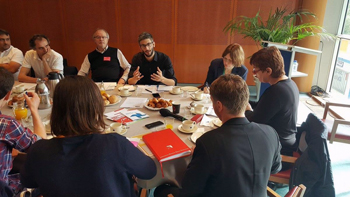Under the auspices of MEP Cornelia Ernst (GUE/NGL), the transform! Working Group on Energy presented its latest publication to representatives of European progressive civil society and members of the European Parliament Committee on Industry, research and Energy (ITRE). Deployment of the energy transition towards a new model of development, energy democracy and citizens’ initiatives, the crucial role of public research – these issues were at the heart of the discussions held on June 14.
The transform! eDossier “A New Energy to Change Europe” intends to provide a comprehensive analysis of what is at stake when talking about a progressive plan for Europe’s energy transition. Its aim is to support the necessary diversity of the ongoing discussions within the European progressive political sphere as well as within social movements and trade unions.
The ambition for the Left must be as high as the stakes. “Energy is at the core of human life and activities. A genuinely progressive energy transition cannot be reduced merely to cosmetic changes. It implies a systemic transformation”, as stated by Professor for mathematics and editor of the eDossier Marc Delepouve. Systemic, because the changes to be undertaken cover a wide range of issues. It is as much an environmental question as it is a social one – energy precariousness and poverty must be eradicated –, a geopolitical one – most of the wars being currently waged find their sources in the control of the last remaining fossil fuel reserves –, and a democratic one – imports in energy make up 25% of overall imports, which gives way too much political power to transnational corporations. Solidarity, international responsibility and energy sovereignty are the corner stones of what could be a left plan for Europe’s energy transition.
It demands a total re-design of the political economy of energy from mostly imported stock-based sources (natural gas, oil, coal, uranium) to local flow-based or stock-based sources (solar, wind, hydro, biogas, biomass). To reach this goal, energy democracy activist and editor of the eDossier Jean-Claude Simon highlighted that “the focus must be given to energy savings and improved energy efficiency and to a definition of the needs – the demand side – with Renewable Energy Sources (RES) – the supply side. It is a long-term process with important societal consequences as it requires producing for need, not for profit.” To take up the challenge, an ambitious investment plan driven by public policies to support the rise of new environmentally sustainable, knowledge intensive, high skill and high-wage economic activities is needed – so is the overcoming of neoclassical economic theories, embraced by most of EU and Member States policy makers.
But even if we would engage in such an investment plan for Europe’s energy transition, de-carbonisation without de-centralisation will not necessarily mitigate the role of transnational corporation in providing people and territories with energy – be it renewables. Who better than the consumers-citizens themselves can define their needs in energy use and the right amount of necessary production? The main purpose of the cooperatives is to build a more efficient system where energy is generated near the location where it is consumed, in only the amounts that are needed, and at the right time. It is thus a switch from a top-down system of capital-intensive companies to a network of producers/consumers. “Citizens now have a choice: either passively undergo the energy transition, or unite and actively take this transition into their own hands. Governments at all levels can support this sustainable choice with policies, information and appropriate measures. REScoops (European Federation for Renewable Energy Cooperatives) are ideal tools for citizens to take control of the energy transition so that the new energy system is democratic, or in other words, ‘cooperative’”.
This view was shared, and deepened, by the Director of the Green European Foundation Aurélie Maréchal as she mentioned the “Public-Citizens Partnerships” for energy production and distribution. This model provides an articulation of public policies together with a citizen management at the local level. Chairwoman of GUE/NGL Gabi Zimmer added: “Social rights and environmental rights should never be divided. We are demanding that every EU citizen benefits from social minimum standards and ecological minimum standards.”
The high degree of convergence between climate justice movements and social justice was already to be witnessed at the Climate Forum, last year in Paris at the margins of the COP21 Conference. Progressive political parties should find ways to come closer together, given that the scope of the divergences was notably reduced in the past years – and even more so because we are running out of time. transform! wishes to contribute to building bridges.
